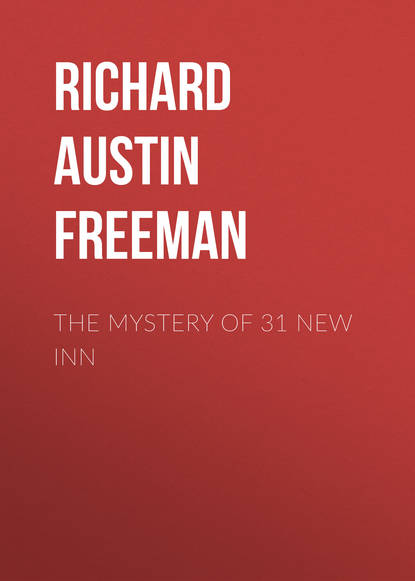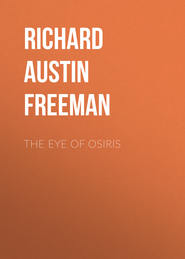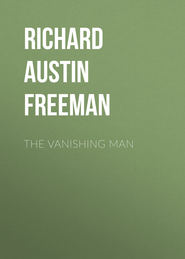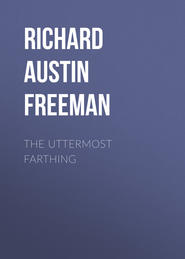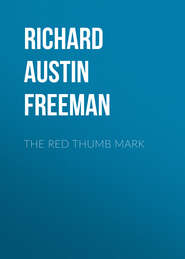По всем вопросам обращайтесь на: info@litportal.ru
(©) 2003-2024.
✖
The Mystery of 31 New Inn
Настройки чтения
Размер шрифта
Высота строк
Поля
"Those are the scales," replied Thorndyke, "that shows the degree of magnification or reduction. The pointer is fixed to the easel and travels with it, of course, showing the exact size of the photograph. When the pointer is opposite 0 the photograph will be identical in size with the object photographed; when it points to, say, × 6, the photograph will be six times as long as the object, or magnified thirty-six times superficially, whereas if the pointer is at ÷ 6, the photograph will be a sixth of the length of the object, or one thirty-sixth superficial."
"Why are there two scales?" Mr. Britton asked.
"There is a separate scale for each of the two lenses that we principally use. For great magnification or reduction a lens of comparatively short focus must be used, but, as a long-focus lens gives a more perfect image, we use one of very long focus—thirty-six inches—for copying the same size or for slight magnification or reduction."
"Are you going to magnify these cheques?" Mr. Britton asked.
"Not in the first place," replied Thorndyke. "For convenience and speed I am going to photograph them half-size, so that six cheques will go on one whole plate. Afterwards we can enlarge from the negatives as much as we like. But we should probably enlarge only the signatures in any case."
The precious bag was now opened and the twenty-three cheques brought out and laid on the bench in a consecutive series in the order of their dates. They were then fixed by tapes—to avoid making pin-holes in them—in batches of six to small drawing boards, each batch being so arranged that the signatures were towards the middle. The first board was clamped to the easel, the latter was slid along its guides until the pointer stood at ÷ 2 on the long-focus scale and Thorndyke proceeded to focus the camera with the aid of a little microscope that Polton had made for the purpose. When Mr. Britton and I had inspected the exquisitely sharp image on the focusing-screen through the microscope, Polton introduced the plate and made the first exposure, carrying the dark-slide off to develop the plate while the next batch of cheques was being fixed in position.
In his photographic technique, as in everything else, Polton followed as closely as he could the methods of his principal and instructor; methods characterized by that unhurried precision that leads to perfect accomplishment. When the first negative was brought forth, dripping, from the dark-room, it was without spot or stain, scratch or pin-hole; uniform in colour and of exactly the required density. The six cheques shown on it—ridiculously small in appearance, though only reduced to half-length—looked as clear and sharp as fine etchings; though, to be sure, my opportunity for examining them was rather limited, for Polton was uncommonly careful to keep the wet plate out of reach and so safe from injury.
"Well," said Mr. Britton, when, at the end of the séance, he returned his treasures to the bag, "you have now got twenty-three of our cheques, to all intents and purposes. I hope you are not going to make any unlawful use of them—must tell our cashiers to keep a bright look-out; and"—here he lowered his voice impressively and addressed himself to me and Polton—"you understand that this is a private matter between Dr. Thorndyke and me. Of course, as Mr. Blackmore is dead, there is no reason why his cheques should not be photographed for legal purposes; but we don't want it talked about; nor, I think, does Dr. Thorndyke."
"Certainly not," Thorndyke agreed emphatically; "but you need not be uneasy, Mr. Britton. We are very uncommunicative people in this establishment."
As my colleague and I escorted our visitor down the stairs, he returned to the subject of the cheques.
"I don't understand what you want them for," he remarked. "There is no question turning on signatures in the case of Blackmore deceased, is there?"
"I should say not," Thorndyke replied rather evasively.
"I should say very decidedly not," said Mr. Britton, "if I understood Marchmont aright. And, even if there were, let me tell you, these signatures that you have got wouldn't help you. I have looked them over very closely—and I have seen a few signatures in my time, you know. Marchmont asked me to glance over them as a matter of form, but I don't believe in matters of form; I examined them very carefully. There is an appreciable amount of variation; a very appreciable amount. But under the variation one can trace the personal character (which is what matters); the subtle, indescribable quality that makes it recognizable to the expert eye as Jeffrey Blackmore's writing. You understand me. There is such a quality, which remains when the coarser characteristics vary; just as a man may grow old, or fat, or bald, or may take to drink, and become quite changed; and yet, through it all, he preserves a certain something which makes him recognizable as a member of a particular family. Well, I find that quality in all those signatures, and so will you, if you have had enough experience of handwriting. I thought it best to mention it in case you might be giving yourself unnecessary trouble."
"It is very good of you," said Thorndyke, "and I need not say that the information is of great value, coming from such a highly expert source. As a matter of fact, your hint will be of great value to me."
He shook hands with Mr. Britton, and, as the latter disappeared down the stairs, he turned into the sitting-room and remarked:
"There is a very weighty and significant observation, Jervis. I advise you to consider it attentively in all its bearings."
"You mean the fact that these signatures are undoubtedly genuine?"
"I meant, rather, the very interesting general truth that is contained in Britton's statement; that physiognomy is not a mere matter of facial character. A man carries his personal trademark, not in his face only, but in his nervous system and muscles—giving rise to characteristic movements and gait; in his larynx—producing an individual voice; and even in his mouth, as shown by individual peculiarities of speech and accent. And the individual nervous system, by means of these characteristic movements, transfers its peculiarities to inanimate objects that are the products of such movements; as we see in pictures, in carving, in musical execution and in handwriting. No one has ever painted quite like Reynolds or Romney; no one has ever played exactly like Liszt or Paganini; the pictures or the sounds produced by them, were, so to speak, an extension of the physiognomy of the artist. And so with handwriting. A particular specimen is the product of a particular set of motor centres in an individual brain."
"These are very interesting considerations, Thorndyke," I remarked; "but I don't quite see their present application. Do you mean them to bear in any special way on the Blackmore case?"
"I think they do bear on it very directly. I thought so while Mr. Britton was making his very illuminating remarks."
"I don't see how. In fact I cannot see why you are going into the question of the signatures at all. The signature on the will is admittedly genuine, and that seems to me to dispose of the whole affair."
"My dear Jervis," said he, "you and Marchmont are allowing yourselves to be obsessed by a particular fact—a very striking and weighty fact, I will admit, but still, only an isolated fact. Jeffrey Blackmore executed his will in a regular manner, complying with all the necessary formalities and conditions. In the face of that single circumstance you and Marchmont would 'chuck up the sponge,' as the old pugilists expressed it. Now that is a great mistake. You should never allow yourself to be bullied and browbeaten by a single fact."
"But, my dear Thorndyke!" I protested, "this fact seems to be final. It covers all possibilities–unless you can suggest any other that would cancel it."
"I could suggest a dozen," he replied. "Let us take an instance. Supposing Jeffrey executed this will for a wager; that he immediately revoked it and made a fresh will, that he placed the latter in the custody of some person and that that person has suppressed it."
"Surely you do not make this suggestion seriously!" I exclaimed.
"Certainly I do not," he replied with a smile. "I merely give it as an instance to show that your final and absolute fact is really only conditional on there being no other fact that cancels it."
"Do you think he might have made a third will?"
"It is obviously possible. A man who makes two wills may make three or more; but I may say that I see no present reason for assuming the existence of another will. What I want to impress on you is the necessity of considering all the facts instead of bumping heavily against the most conspicuous one and forgetting all the rest. By the way, here is a little problem for you. What was the object of which these are the parts?"
He pushed across the table a little cardboard box, having first removed the lid. In it were a number of very small pieces of broken glass, some of which had been cemented together by their edges.
"These, I suppose," said I, looking with considerable curiosity at the little collection, "are the pieces of glass that we picked up in poor Blackmore's bedroom?"
"Yes. You see that Polton has been endeavouring to reconstitute the object, whatever it was; but he has not been very successful, for the fragments were too small and irregular and the collection too incomplete. However, here is a specimen, built up of six small pieces, which exhibits the general character of the object fairly well."
He picked out the little irregularly shaped object and handed it to me; and I could not but admire the neatness with which Polton had joined the tiny fragments together.
I took the little "restoration," and, holding it up before my eyes, moved it to and fro as I looked through it at the window.
"It was not a lens," I pronounced eventually.
"No," Thorndyke agreed, "it was not a lens."
"And so cannot have been a spectacle-glass. But the surface was curved—one side convex and the other concave—and the little piece that remains of the original edge seems to have been ground to fit a bezel or frame. I should say that these are portions of a watch-glass."
"That is Polton's opinion," said Thorndyke, "and I think you are both wrong."
"What do you say to the glass of a miniature or locket?"
"That is rather more probable, but it is not my view."
"What do you think it is?" I asked. But Thorndyke was not to be drawn.
"I am submitting the problem for solution by my learned friend," he replied with an exasperating smile, and then added: "I don't say that you and Polton are wrong; only that I don't agree with you. Perhaps you had better make a note of the properties of this object, and consider it at your leisure when you are ruminating on the other data referring to the Blackmore case."
"My ruminations," I said, "always lead me back to the same point."
"But you mustn't let them," he replied. "Shuffle your data about. Invent hypotheses. Never mind if they seem rather wild. Don't put them aside on that account. Take the first hypothesis that you can invent and test it thoroughly with your facts. You will probably have to reject it, but you will be certain to have learned something new. Then try again with a fresh one. You remember what I told you of my methods when I began this branch of practice and had plenty of time on my hands?"
"I am not sure that I do."
"Well, I used to occupy my leisure in constructing imaginary cases, mostly criminal, for the purpose of study and for the acquirement of experience. For instance, I would devise an ingenious fraud and would plan it in detail, taking every precaution that I could think of against failure or detection, considering, and elaborately providing for, every imaginable contingency. For the time being, my entire attention was concentrated on it, making it as perfect and secure and undetectable as I could with the knowledge and ingenuity at my command. I behaved exactly as if I were proposing actually to carry it out, and my life or liberty depended on its success—excepting that I made full notes of every detail of the scheme. Then when my plans were as complete as I could make them, and I could think of no way in which to improve them, I changed sides and considered the case from the standpoint of detection. I analysed the case, I picked out its inherent and unavoidable weaknesses, and, especially, I noted the respects in which a fraudulent proceeding of a particular kind differed from the bona fide proceeding that it simulated. The exercise was invaluable to me. I acquired as much experience from those imaginary cases as I should from real ones, and in addition, I learned a method which is the one that I practise to this day."
"Do you mean that you still invent imaginary cases as mental exercises?"
"No; I mean that, when I have a problem of any intricacy, I invent a case which fits the facts and the assumed motives of one of the parties. Then I work at that case until I find whether it leads to elucidation or to some fundamental disagreement. In the latter case I reject it and begin the process over again."
"Doesn't that method sometimes involve a good deal of wasted time and energy?" I asked.
"No; because each time that you fail to establish a given case, you exclude a particular explanation of the facts and narrow down the field of inquiry. By repeating the process, you are bound, in the end, to arrive at an imaginary case which fits all the facts. Then your imaginary case is the real case and the problem is solved. Let me recommend you to give the method a trial."
I promised to do so, though with no very lively expectations as to the result, and with this, the subject was allowed, for the present, to drop.
"Why are there two scales?" Mr. Britton asked.
"There is a separate scale for each of the two lenses that we principally use. For great magnification or reduction a lens of comparatively short focus must be used, but, as a long-focus lens gives a more perfect image, we use one of very long focus—thirty-six inches—for copying the same size or for slight magnification or reduction."
"Are you going to magnify these cheques?" Mr. Britton asked.
"Not in the first place," replied Thorndyke. "For convenience and speed I am going to photograph them half-size, so that six cheques will go on one whole plate. Afterwards we can enlarge from the negatives as much as we like. But we should probably enlarge only the signatures in any case."
The precious bag was now opened and the twenty-three cheques brought out and laid on the bench in a consecutive series in the order of their dates. They were then fixed by tapes—to avoid making pin-holes in them—in batches of six to small drawing boards, each batch being so arranged that the signatures were towards the middle. The first board was clamped to the easel, the latter was slid along its guides until the pointer stood at ÷ 2 on the long-focus scale and Thorndyke proceeded to focus the camera with the aid of a little microscope that Polton had made for the purpose. When Mr. Britton and I had inspected the exquisitely sharp image on the focusing-screen through the microscope, Polton introduced the plate and made the first exposure, carrying the dark-slide off to develop the plate while the next batch of cheques was being fixed in position.
In his photographic technique, as in everything else, Polton followed as closely as he could the methods of his principal and instructor; methods characterized by that unhurried precision that leads to perfect accomplishment. When the first negative was brought forth, dripping, from the dark-room, it was without spot or stain, scratch or pin-hole; uniform in colour and of exactly the required density. The six cheques shown on it—ridiculously small in appearance, though only reduced to half-length—looked as clear and sharp as fine etchings; though, to be sure, my opportunity for examining them was rather limited, for Polton was uncommonly careful to keep the wet plate out of reach and so safe from injury.
"Well," said Mr. Britton, when, at the end of the séance, he returned his treasures to the bag, "you have now got twenty-three of our cheques, to all intents and purposes. I hope you are not going to make any unlawful use of them—must tell our cashiers to keep a bright look-out; and"—here he lowered his voice impressively and addressed himself to me and Polton—"you understand that this is a private matter between Dr. Thorndyke and me. Of course, as Mr. Blackmore is dead, there is no reason why his cheques should not be photographed for legal purposes; but we don't want it talked about; nor, I think, does Dr. Thorndyke."
"Certainly not," Thorndyke agreed emphatically; "but you need not be uneasy, Mr. Britton. We are very uncommunicative people in this establishment."
As my colleague and I escorted our visitor down the stairs, he returned to the subject of the cheques.
"I don't understand what you want them for," he remarked. "There is no question turning on signatures in the case of Blackmore deceased, is there?"
"I should say not," Thorndyke replied rather evasively.
"I should say very decidedly not," said Mr. Britton, "if I understood Marchmont aright. And, even if there were, let me tell you, these signatures that you have got wouldn't help you. I have looked them over very closely—and I have seen a few signatures in my time, you know. Marchmont asked me to glance over them as a matter of form, but I don't believe in matters of form; I examined them very carefully. There is an appreciable amount of variation; a very appreciable amount. But under the variation one can trace the personal character (which is what matters); the subtle, indescribable quality that makes it recognizable to the expert eye as Jeffrey Blackmore's writing. You understand me. There is such a quality, which remains when the coarser characteristics vary; just as a man may grow old, or fat, or bald, or may take to drink, and become quite changed; and yet, through it all, he preserves a certain something which makes him recognizable as a member of a particular family. Well, I find that quality in all those signatures, and so will you, if you have had enough experience of handwriting. I thought it best to mention it in case you might be giving yourself unnecessary trouble."
"It is very good of you," said Thorndyke, "and I need not say that the information is of great value, coming from such a highly expert source. As a matter of fact, your hint will be of great value to me."
He shook hands with Mr. Britton, and, as the latter disappeared down the stairs, he turned into the sitting-room and remarked:
"There is a very weighty and significant observation, Jervis. I advise you to consider it attentively in all its bearings."
"You mean the fact that these signatures are undoubtedly genuine?"
"I meant, rather, the very interesting general truth that is contained in Britton's statement; that physiognomy is not a mere matter of facial character. A man carries his personal trademark, not in his face only, but in his nervous system and muscles—giving rise to characteristic movements and gait; in his larynx—producing an individual voice; and even in his mouth, as shown by individual peculiarities of speech and accent. And the individual nervous system, by means of these characteristic movements, transfers its peculiarities to inanimate objects that are the products of such movements; as we see in pictures, in carving, in musical execution and in handwriting. No one has ever painted quite like Reynolds or Romney; no one has ever played exactly like Liszt or Paganini; the pictures or the sounds produced by them, were, so to speak, an extension of the physiognomy of the artist. And so with handwriting. A particular specimen is the product of a particular set of motor centres in an individual brain."
"These are very interesting considerations, Thorndyke," I remarked; "but I don't quite see their present application. Do you mean them to bear in any special way on the Blackmore case?"
"I think they do bear on it very directly. I thought so while Mr. Britton was making his very illuminating remarks."
"I don't see how. In fact I cannot see why you are going into the question of the signatures at all. The signature on the will is admittedly genuine, and that seems to me to dispose of the whole affair."
"My dear Jervis," said he, "you and Marchmont are allowing yourselves to be obsessed by a particular fact—a very striking and weighty fact, I will admit, but still, only an isolated fact. Jeffrey Blackmore executed his will in a regular manner, complying with all the necessary formalities and conditions. In the face of that single circumstance you and Marchmont would 'chuck up the sponge,' as the old pugilists expressed it. Now that is a great mistake. You should never allow yourself to be bullied and browbeaten by a single fact."
"But, my dear Thorndyke!" I protested, "this fact seems to be final. It covers all possibilities–unless you can suggest any other that would cancel it."
"I could suggest a dozen," he replied. "Let us take an instance. Supposing Jeffrey executed this will for a wager; that he immediately revoked it and made a fresh will, that he placed the latter in the custody of some person and that that person has suppressed it."
"Surely you do not make this suggestion seriously!" I exclaimed.
"Certainly I do not," he replied with a smile. "I merely give it as an instance to show that your final and absolute fact is really only conditional on there being no other fact that cancels it."
"Do you think he might have made a third will?"
"It is obviously possible. A man who makes two wills may make three or more; but I may say that I see no present reason for assuming the existence of another will. What I want to impress on you is the necessity of considering all the facts instead of bumping heavily against the most conspicuous one and forgetting all the rest. By the way, here is a little problem for you. What was the object of which these are the parts?"
He pushed across the table a little cardboard box, having first removed the lid. In it were a number of very small pieces of broken glass, some of which had been cemented together by their edges.
"These, I suppose," said I, looking with considerable curiosity at the little collection, "are the pieces of glass that we picked up in poor Blackmore's bedroom?"
"Yes. You see that Polton has been endeavouring to reconstitute the object, whatever it was; but he has not been very successful, for the fragments were too small and irregular and the collection too incomplete. However, here is a specimen, built up of six small pieces, which exhibits the general character of the object fairly well."
He picked out the little irregularly shaped object and handed it to me; and I could not but admire the neatness with which Polton had joined the tiny fragments together.
I took the little "restoration," and, holding it up before my eyes, moved it to and fro as I looked through it at the window.
"It was not a lens," I pronounced eventually.
"No," Thorndyke agreed, "it was not a lens."
"And so cannot have been a spectacle-glass. But the surface was curved—one side convex and the other concave—and the little piece that remains of the original edge seems to have been ground to fit a bezel or frame. I should say that these are portions of a watch-glass."
"That is Polton's opinion," said Thorndyke, "and I think you are both wrong."
"What do you say to the glass of a miniature or locket?"
"That is rather more probable, but it is not my view."
"What do you think it is?" I asked. But Thorndyke was not to be drawn.
"I am submitting the problem for solution by my learned friend," he replied with an exasperating smile, and then added: "I don't say that you and Polton are wrong; only that I don't agree with you. Perhaps you had better make a note of the properties of this object, and consider it at your leisure when you are ruminating on the other data referring to the Blackmore case."
"My ruminations," I said, "always lead me back to the same point."
"But you mustn't let them," he replied. "Shuffle your data about. Invent hypotheses. Never mind if they seem rather wild. Don't put them aside on that account. Take the first hypothesis that you can invent and test it thoroughly with your facts. You will probably have to reject it, but you will be certain to have learned something new. Then try again with a fresh one. You remember what I told you of my methods when I began this branch of practice and had plenty of time on my hands?"
"I am not sure that I do."
"Well, I used to occupy my leisure in constructing imaginary cases, mostly criminal, for the purpose of study and for the acquirement of experience. For instance, I would devise an ingenious fraud and would plan it in detail, taking every precaution that I could think of against failure or detection, considering, and elaborately providing for, every imaginable contingency. For the time being, my entire attention was concentrated on it, making it as perfect and secure and undetectable as I could with the knowledge and ingenuity at my command. I behaved exactly as if I were proposing actually to carry it out, and my life or liberty depended on its success—excepting that I made full notes of every detail of the scheme. Then when my plans were as complete as I could make them, and I could think of no way in which to improve them, I changed sides and considered the case from the standpoint of detection. I analysed the case, I picked out its inherent and unavoidable weaknesses, and, especially, I noted the respects in which a fraudulent proceeding of a particular kind differed from the bona fide proceeding that it simulated. The exercise was invaluable to me. I acquired as much experience from those imaginary cases as I should from real ones, and in addition, I learned a method which is the one that I practise to this day."
"Do you mean that you still invent imaginary cases as mental exercises?"
"No; I mean that, when I have a problem of any intricacy, I invent a case which fits the facts and the assumed motives of one of the parties. Then I work at that case until I find whether it leads to elucidation or to some fundamental disagreement. In the latter case I reject it and begin the process over again."
"Doesn't that method sometimes involve a good deal of wasted time and energy?" I asked.
"No; because each time that you fail to establish a given case, you exclude a particular explanation of the facts and narrow down the field of inquiry. By repeating the process, you are bound, in the end, to arrive at an imaginary case which fits all the facts. Then your imaginary case is the real case and the problem is solved. Let me recommend you to give the method a trial."
I promised to do so, though with no very lively expectations as to the result, and with this, the subject was allowed, for the present, to drop.





